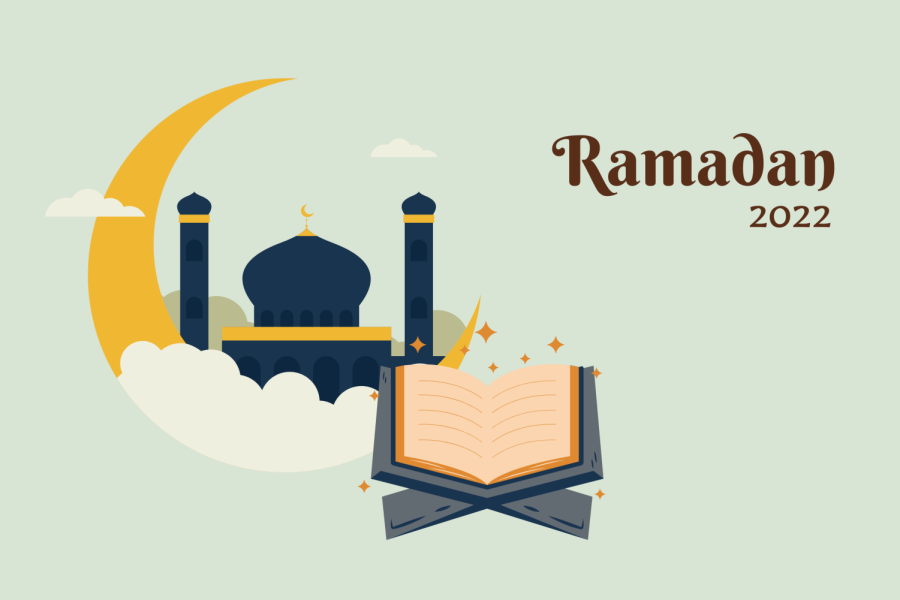Why I’m Not Eating or Drinking This Month (Yes, Even Water)
How does participating in Ramadan affect the lives of students?
April 11, 2022
How many of us have grown up hearing breakfast is the most important meal of the day? A holler from your mother to grab a granola bar as you make your way out the door and off to school. Michelle Obama lecturing you on your TV to eat right and – more importantly – to start the day off properly with a satisfying meal of whole foods. Your college campus occasionally offering surprise free bagels to students all because starting off your day fully satiated has always been deemed a necessary step in staying balanced, motivated, and productive.
Nevertheless, each year during the Islamic month of Ramadan, 1.6 billion Muslims across the world fast from dawn to dusk each day, going about their regular responsibilities without any food or drink.
Ramadan, the ninth month in the Islamic calendar that is known as the Hijri calendar, marks the beginning of the holiest month of the year for Muslims. The Hijri calendar is lunar-based, meaning the start and end of each month follows the phases of the moon rather than a specific or perpetual date, so the 29 to 30 days of Ramadan fall at a different time each year. The start and end of the month usually occur about two weeks earlier each year in concordance with the moon cycle.
Right before dawn, Muslims wake up to eat the first meal called Suhoor in order to prepare themselves for a day of fasting ahead. At the call of the dawn prayer, Fajr, all eating and drinking must cease until the sun sets; at this time, Muslims break their fast with a date fruit – in order to emulate the Prophet Muhammad’s traditions – and any other foods and drinks of their choosing at the Iftar meal. The time of both meals are relative to the season that Ramadan occurs, meaning that summer fasts can last up to 18 hours while winter fasts last around 7 hours.
Although fasting, referred to as saum in Arabic, is considered one of the five main pillars of Islam, it is not a requirement for everybody. Those with physical or mental illness, either temporary or chronic, are exempt from fasting, although those ill temporarily would be required to make up for the missed fasts at a later date. This is also applicable to those traveling during the month of Ramadan. Women while on their periods, pregnant or breastfeeding are also not required to fast while in those states. Children that have not reached puberty and the elderly that would be detrimentally affected are exempt altogether.
This year, Ramadan began on April 1. Many Muslim students in high school and collegiate studies have been undertaking school, participating in extracurriculars, and going to work each day in a fasted state.
College of DuPage student Subhan Akhoon finds balance in his day-to-day responsibilities while fasting because he normally doesn’t eat breakfast and skips straight to lunch.
“Academically, since all of my classes are in the morning, it doesn’t impact me that much,” he said. “However, my sleep schedule has been off, and that definitely affects my work during school due to little or zero energy to focus.”
Some female Muslim students have had different experiences thus far because of the flexibility given to Muslim women in certain states. Accounting student Maryam Khader said fasting isn’t the only challenge for busy people during Ramadan.
“I haven’t fasted in school just yet. But I do anticipate it making it slightly harder for me to focus on class,” Khader said. “It’s also hard to balance school during Ramadan because we have to find time to sleep and do our prayers whilst also getting our work done.”
These circumstances affect younger Muslim students as well.
Glenbard South High School sophomore Zahraa Jaleel finds it extra difficult during Ramadan to balance both parts of her life.
“Fasting has really disrupted school for me. I get really tired and hungry, and I can’t pay attention. Then, I can’t do my homework after school because I’m so tired. So I just sleep to gain energy,” Jaleel said. “Since we break so late, getting done with dinner and everything by 8:30, it gets harder to do homework so late.”
A junior student from Glenbard East High School, Saad Hussain, said, “Fasting during school and also working gets pretty tiring. I genuinely just go late some days because I’m extremely tired.”
However, Ramadan is about so much more than just abstaining from food or drink for a day. It is meant to instill empathy for those less fortunate who don’t have access to food or drink through the entire year. It is a month intended to cleanse the mind, body and spirit of harmful practices and replacing the unhealthy habits with healthy ones.
Muslims are encouraged to spend more time building a genuine relationship with God and their loved ones. We pray for clarity, peace and our own desires during a month that good deeds are 70 times more valuable, and God feels closer.
As a result of the month’s endeavors, Muslims individually grow better self-disciplined and gain further self-development. The culmination of Ramadan is the Islamic holiday of Eid al-Fitr, which marks the end of fasting and is celebrated through decorative clothing, food and drink, gifts and spending the day with loved ones. The Islamic Circle of North America (ICNA) hosts a large, community festival each summer with amusement park rides and carnival food to commemorate the holiday.




















